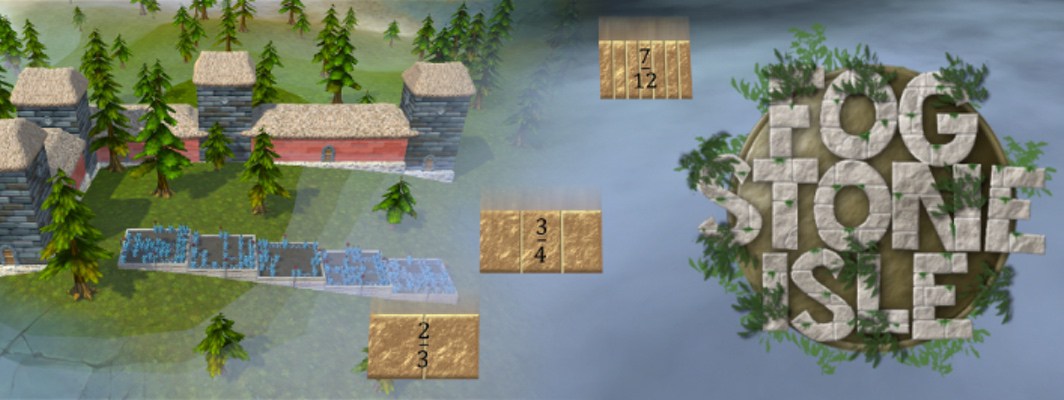The summer slide, a loss of academic progress during the summer break between school years, has been confirmed in many research studies since an early publication by White in 1906 [1]. All too often kids arrive back at school in the fall worse off in mathematics than they finished in the spring, causing teachers to give up weeks of class time, or more, to make up for that loss.
An early stage education technology company, Cignition, is attempting to break that trend through a summer program that keeps students engaged in mathematics through their online virtual world Fog Stone Isle.
Research Support for the Summer Math Slide
According to a newsletter from the Harvard Graduate School of Education [2], on average, students lose 2.6 months of learning in math during the summer break. They also note that math learning loss is bigger than reading, and cuts across all socioeconomic backgrounds. They suggest that, while reading activities are often part of a family’s daily life, parents and kids don’t usually think about math outside the classroom. (Try to imagine a bedtime math routine rather than a reading routine.)
Duffet et al [3], summarizing a study sponsored by the Wallace Foundation, looked at what kids and parents really want from out of school time. One clear result was that parents and students value free time and a break from school, and kids especially are far more likely to spend their summer playing video games than engaging in anything mathematical. This study provides evidence for the enhanced need, over the summer, to provide engaging activities that are mathematical, while providing creative freedom and an activity that makes the math meaningful in relation to the real world.
A survey conducted by the National Summer Learning Association (NSLA) [5] of 500 teachers from 16 school districts around the US found that the summer slide results in substantial loss of classroom time for teaching new material – the article states, “66% of the teachers said it takes them at least 2-3 weeks to teach the previous year’s skills at the beginning of a new school year. Of those, more than a third said it takes them 5 weeks or more.”
Summer Learning Opportunities
The summer offers a multitude of learning opportunities. Online classes, how-to videos, applications and games, workshops, camps and exploring the communities near you. Maker projects can be simple and engaging for kids to do at home, which enhance design-thinking and persistence skills. Teachers and parents can plan and suggest what’s right for their students and children. It’s important to find strategies that fit into busy schedules to reduce the summer slide and substantial classroom loss.
Digital Promise looked at results using four different ed-tech products across three school districts as part of summer programs to reduce the summer slide in reading and/or math [6]. Two of the key conclusions were:
In order to get students engaged, it is important to recruit parents and students early
In order to maintain students’ motivation, it is useful to provide ongoing incentives. In one district, a culminating celebration for students was offered. The educators involved recommended, for the future, selecting ed-tech tools that are highly interactive and fun in order to keep students motivated.
At Digital Promise, education leaders seeking to curb summer learning loss have experimented with providing students with devices equipped with ed-tech tools to use over the summer. Emerging research suggests this approach has promise, but there is still limited evidence to help district leaders identify which strategies will be most successful.
To learn more about the use of ed-tech in summer learning, we worked with three Digital Promise League of Innovative Schools districts last summer to pilot four ed-tech products: Mathspace, TenMarks, eSpark, and Amplify Games. In our report, Rapid Cycle Pilots: Summer Ed-Tech Programs, we share key findings on how the summer programs were structured, and offer tips for implementing ed-tech over the summer.
All of the studies cited above support a number of conclusions:
- The summer slide is a significant barrier to progress in math and reading.
- The summer slide results in wasted class time reviewing old material rather than introducing new material.
- The success of summer programs to reverse the summer slide in math depends on techniques to keep students highly engaged and motivated so that they participate on a continuing basis.
(Next page: The virtual island for summer math)
Cignition’s Summer Learning Effort for 2017
Cignition’s research shows that students not only enjoy playing but make significant gains in their math knowledge when playing Fog Stone Isle, an online fantasy world that teaches the difficult math concepts through crafting activities. And for students playing this summer, they understand that they’re competing for their attention, so will be including extra incentives to play, including an award of five Nintendo Switch game consoles to the most improved players.

Cignition summer learning program also encourages teachers to administer end-of-year pretests in May/June and beginning-of-year post-tests at the start of the new school year, embedding an efficacy study for all interested participants. Ideally, they would like participating and non-participating classrooms to administer the same pre and post tests, in order to be able to better tease out the source of measured gains. Teachers can utilize the program for free and, upon registration, can enroll to participate in the summer efficacy study at: fogstoneisle.com.
Fog Stone Isle was created by neuroscientists, teachers, and game designers. As players craft their world, they grapple with the mathematics – learning the underlying concepts and building mastery. The system records every game move, enabling the measurement of cognitive abilities as well as mathematical understanding and skill. Those measurements, in turn, feed a machine learning engine which constantly adapts to every player and enables ongoing product improvement.
Given the importance and challenge of keeping kids engaged with a summer math intervention, Fog Stone Isle may work well for a number of reasons:
Rather than superficially reviewing an entire year of mathematics curriculum, it focuses on the most important mathematical concepts that are gateways to future learning. Procedural fluency is solidified by exercising those concepts and topics, so students are primed and ready to move forward in mathematics from the very beginning of the school year.
It provides an environment in which mathematics is intrinsic to crafting activities that resemble real-world application of mathematical understanding.
It allows students great creative freedom in crafting their own unique world.
The world kids are crafting grows throughout the summer – kids can continuously observe the fruits of their labor.
Detailed measurements of progress in mathematical understanding and fluency are shared with students, parents, prior-year-teachers and following-year-teachers.
Detailed adaptation and scaffolding enable students across a wide spectrum of abilities (mathematical and cognitive) to progress and succeed.
Cignition will also be working with teachers that are interested in participating in a comprehensive nationwide efficacy study, gauging the overall success of the program.
To learn more visit: cignition.com/summer
[Editor’s Note: This piece was originally published on Digital Promise’s site here.]
References
[1] White, W. (1906). Reviews before and after vacation. American Education, 185-188.
[2] http://www.gse.harvard.edu/news/uk/16/06/summer-math-loss (by Leah Shafer, June 24, 2016)
[3] Duffet, A., Johnson, J., Farkas, S., King, S., & Ott, A. (2004). All work and no play? Listening to what kids and parents really want from Out of School Time. Commissioned by The Wallace Foundation
[4] Cooper, Nye, Charlton, Lindsay, and Greathouse, “The Effects of Summer Vacation on Achievement Test Scores: A Narrative and Meta-Analytic Review”, Review of Educational Research, Fall 1996, no 3, pp 227-268
[5] National Summer Learning Association (NSLA)
http://www.ca-ilg.org/sites/main/files/file-attachments/impact_on_teaching_and_learn.pdf
[6] Digital Promise: How School Districts Work to Improve Summer Learning with Ed-Tech Programs
http://digitalpromise.org/2017/01/11/school-districts-work-improve-summer-learning-ed-tech-programs/
and Digital Promise: Rapid Cycle Pilots: Summer Ed-Tech Programs
http://digitalpromise.org/wp-content/uploads/2016/03/dp-rcp-summerprograms.pdf
- Using universal screening to improve student well-being - April 22, 2024
- 3 ways to avoid summer learning loss - April 19, 2024
- High school students say AI will change the workforce - April 18, 2024


